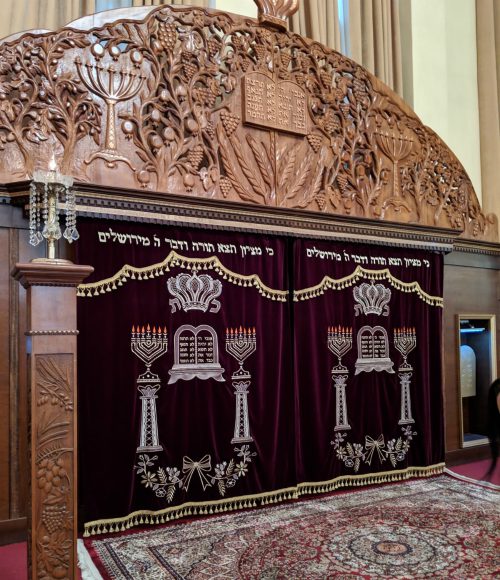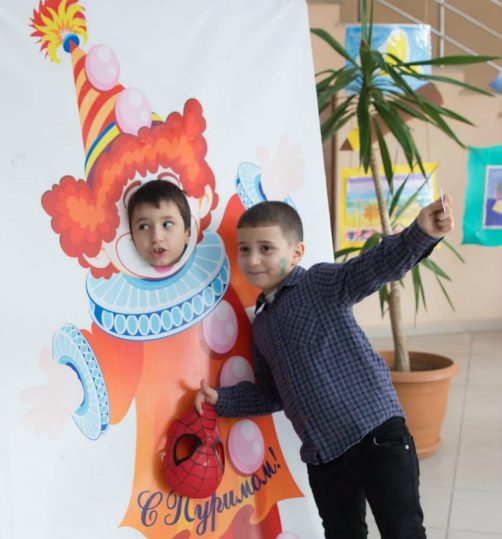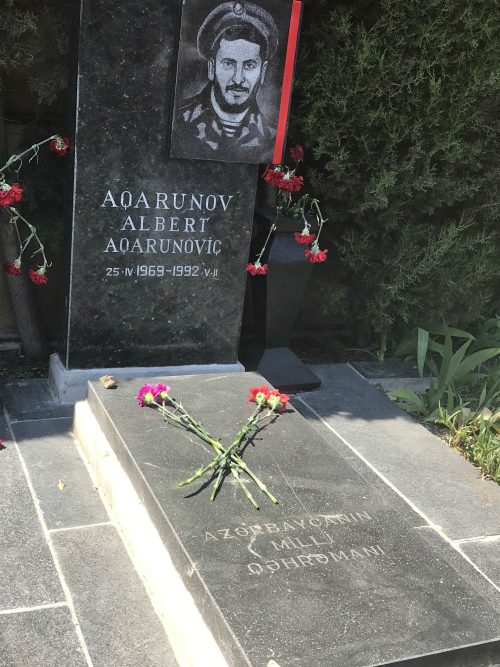BAKU — Meet the real Mountain Jews. No, they’re not from Leadville or Fairplay. In fact, they’re not even from Colorado. The real Mountain Jews hail from a remote corner of the Caucusus Mountains, descendent from Persian Jewry.
I had the opportunity to meet with members of this ancient Jewish community during my recent trip to Azerbaijan, one of the three Caucasus countries. That simple dichotomy of Ashkenazic and Sephardic Jewry? It doesn’t exist, and one of the benefits of growing global connectivity is that we’re discovering all kinds of Jews most of us never knew about.
Mountain Jews have been a known ethnic Jewish subset since the 5th century BCE, inhabiting areas of ancient Persia, parts of which today are in Azerbaijan and elsewhere in the region. Most of today’s Mountain Jewish community in Azerbaijan began arriving in the 13th century and continued migrating in the centuries that followed.

The Torah art in the Baku’s newest synagogue. (Farah Khan)
Like so many other Jewish groups, Mountain Jews speak a unique dialect, an adaptation of the lingua franca, in their case Persian, or Farsi, mixed with a smattering of Hebrew. Juhuri it’s called, and in their language, Mountain Jews are known as Juhuro.
This community has continued to exist, uninterrupted in Azerbaijan, through the Holocaust, through a Soviet regime that suppressed religion. Now, under a government that actively encourages religious life, Mountain Jews are thriving. Older synagogues are being refurbished; a new museum dedicated to the history of the Mountain Jews is underway; a yeshiva has been established; and, in the capital city of Baku, a new synagogue has been constructed.
While Baku is home to most of Azerbaijan’s Jews, it is the Qirmizi Qesebe neighborhood of Quba, a town northeast of the capital, that is the historic and cultural heartland of Azerbaijan’s Mountain Jews. In this “red village,” as Qirmizi Qesebe translates in English and Russian, Jews are the predominant ethnic group. Synagogues line the streets. Stars of David decorate facades. Mezuzzahs dot doorways. It is home to a yeshiva, kosher butcher and newly trained rabbis.
This where the new museum — construction already underway — will be. The imposing red brick building will also be home to a gym, wedding hall and community center.
The museum is an exact replica of a synagogue that once stood there, embodying this community’s connection to its past, while recognizing that attracting and retaining younger Jews will require newer, modern facilities.
In Baku, in the newly built shul for Mountain Jews, Milikh Yevdayev, head of the Mountain Jews community, recounts how during the Soviet era there was deep concern about who would pass on their centuries-old traditions. While the community continued to exist under that repressive rule, “it was harder to practice,” says Yevdayev. “Now we can practice freely.”
Over tea and sweets — seemingly an Azerbaijani custom, as a homey spread greeted us at every stop — Yevdayev proudly shares the community’s accomplishments, and its challenges.
Like many small communities here in the US too, Mountain Jews are confronted with ensuring continuity and countering assimilation, not to mention, the reality of young Jews moving to larger Jewish hubs, whether in Russia, the US or Israel. Quba’s Mountain Jewish community has shrunk to some 3,000 since a heyday of around 10,000 in the 1980s. For the Mountain Jews of Azerbaijan, maintaining their unique customs is important, and they’ve met the challenge head on.
Three rabbis serve the communities, locals who studied in Israel and Russia but returned home to serve their communities. They also serve as shochtim and mohels. The yeshiva in particular is important, as Jewish knowledge — even the ability to read rudimentary Hebrew — had almost disappeared by the end of the Soviet period.
The museum-cum-community center is also part of efforts to ensure the future viability of Jewish life in Quba.
Making it all possible in large degree, is financial and moral support from Azerbaijan’s government.
Azerbaijan, a predominantly Muslim country (96%) is home to a sizable Jewish community of 30,000 people and eight synagogues. According to Jewish communal leaders, both Ashkenazi and Mountain, the government strongly supports its Jewish communities, of which there are actually three: Georgian Jews, which, unfortunately, the delegation I was part of did not have the opportunity to meet.
I first met Rabbi Schneor Segal, head of the Ashkenazic community, at the opening ceremony for the Fifth World Forum on Intercultural Dialogue, May 2-3, the conference for which I was invited to Azerbaijan. He was one of the visibly Jewish attendees in a mass of hundreds of people. Later he was also present at panel discussion on multi-culturalism, at which Milikh Yevdayev participated.
There are about 10,000 Ashkenazi Jews in Azerbaijan, many of whom are Russian.
Although our delegation did not officially meet with the Ashkenazi community, Rabbi Segal filled me on his community’s vibrancy.
He shared photos from recent communal events, such as a Purim dinner as well as a youth Shabbaton.
Segal also represents Azerbaijani Jewry outside the country, either by accompanying local students to Jewish gatherings elsewhere in Europe (soon after the forum he was on such a mission in Italy and Croatia) or leading a delegation of representatives of the World Jewish and Euro Asian Jewish Congresses to meet Azerbaijan’s president, Ilham Aliyev.
Segal, who is a Chabad rabbi, says that through events and other activities, what he calls an “outreach policy,” the community reaches 3,000-4,000 Jews per year.

Jewish youth celebrate Purim in Baku (Courtesy Rabbi Shneor Segal)
The “close relationship” the community maintains with the government means support, financial and otherwise, for important Jewish infrastructure, such as day schools, of which there are two in Baku.
Recently, a kosher restaurant under his supervision, named 7/40, opened in Baku.
In Quba, Milikh Yevdayev is our guide, a fitting role for someone who sees himself as a messenger, both for Azerbaijan and the Mountain Jewish community.
While Mountain Jews may not be an everyday term for most of the world’s Jews, they are a proud community with a deeply engaged Diaspora. It was Mountain Jews living in Moscow who renovated the first synagogue following the Soviet period.
While in Quba, we meet a group of Israeli Jews descended from Quba, who have returned to seek out their roots and pay homage. This is typical, says Yevdayev. If Mountain Jews move overseas, he says, they stay connected. “It’s in their souls.”
Yevdayev himself, although he lives in Baku, is building a second home in Quba to keep his descendants — who live in Azerbaijan, Russia and the US — connected to their place of origin.
“It’s to ensure legacy,” he says, proudly guiding us through his palatial home, still being renovated.
The country couldn’t ask for a stronger representative. He is deeply — and perhaps equally — proud of his Azerbaijani and Jewish roots. At the synagogue in Baku he points out the photos — one of his father — of the local Jewish Red Army veterans who fought in WW II.
He also tells us the story of Albert Agarunov, whose memorial at Martyr’s Lane we visited on our first day in Baku.
Agaranov, a Mountain Jew, died in the Nagorno-Karabkh War, during the battle of Shusha in 1992. According to what we were told, Agaranov was a tank commander who died because he left his tank to remove the bodies of dead Azerbaijani soldiers lying on the streets.
He is now part of Martyr’s Lane, a memorial park in central Baku overlooking the Caspian Sea that honors Azerbaijani citizens who died in “Black January,” as the 1991 uprising against the Soviets is called, and during the Nagorno-Karabakh War. He is remembered, too, in a memorial plaque in Baku’s newest synagogue
For Yevdayev, this pride in Mountain Jews is inextricably linked with his pride in Azerbaijan. He has a masterful command of Azeri poetry and song (an impromptu performance over lunch with generous amounts of vodka attested to that), and is, according to our local guides, extremely articulate in the language.
While the two communities — Ashkenazi and Mountain — maintain good relations, for Yevdayev the Mountain community is more deeply rooted in Azerbaijan. Its first language is Azerbaijani, as opposed to Russian.
The Mountain Jews, he says, are more concentrated, while Ashkenazi Jews are more spread out. There is even a parliamentarian, Yevdov Abramov, who is a Mountain Jew.
Some of the Mountain Jewish customs resemble those of local Azerbaijani customs, he says.
Indeed, we witnessed this when visiting one of the synagogues in Quba. Before entering the sanctuary, we were instructed to remove our shoes, a custom widely practiced in Islam. Did the local Jews adapt it from their Muslim neighbors? Or is it a pragmatic custom that evolved to protect the beautifully decorated rugs that overlap the synagogue’s floor, covering every inch?
Most of Azerbaijan’s 20,000 Mountain Jews live not in Quba, however, but in Baku, which is why that city is home to the country’s newest synagogue. At the time the synagogue was built, in 2015, a new Torah was commissioned and heavily supported by the Los Angeles Sinai Temple.
When it arrived in Baku, there was a public hachnasat Sefer Torah, or celebratory procession. The community marched through the streets, with locals looking on or even joining in, says Yevdayev.

Jewish Azerbaijani Albert Agarunov is memorialized in Baku’s Martyr’s Lane. (Nurit Greenger)
To him, that moment encapsulated Azerbaijan. He feels that Azerbaijan, as a Muslim country, is unique in its support for its Jewish community. Mountain Jews, he says, are not merely tolerated in Azerbaijan, they are respected and viewed as part of the larger culture.
Yom HaShoah, Holocaust Remembrance Day, fell during my trip to Azerbaijan. This important day wasn’t forgotten in Azerbaijan. It was marked in a ceremony hosted by the Israeli embassy, but attended by both foreign dignitaries and local parliamentarians.
The ceremony took place in a beautifully restored mansion built by the Nobels (key industrialists in Baku’s first oil boom in the early 20th century). Somber violin music threaded the ceremony, poetry was recited, words were spoken. The sacrifice of the Red Army, specifically its Azeri component, during WW II was highlighted.
Did I expect to attend a Yom HaShoah ceremony in a Muslim country? No. Honestly, what was remarkable about the experience was how unremarkable it was. During my short trip to Azerbaijan I never felt neither special nor different because I was Jewish. It simply felt normal.
Home to 30 cultures, Azerbaijan is trying to create a sense of home for its varied populations. Its conflict with Armenia means that its relationship with Christian churches is different from its relationship with Jewish synagogues, but the country maintains 14 active churches of various denominations, including Armenian.
Unfortunately we did not have time to visit a church, which would have added even another dimension to the whirlwind tour.
At the Multicultural Center we visited, its executive director Ravan Hasanov told us that “people feel at home here.”
When it comes to its Jewish citizens, whether from its Ashkenazi or Mountain Jewish communities, a sense of home pervades.
“We feel safe, not persecuted,” says Yevdayev.
Shana Goldberg may be reached at [email protected]
Copyright © 2019 by the Intermountain Jewish News
















